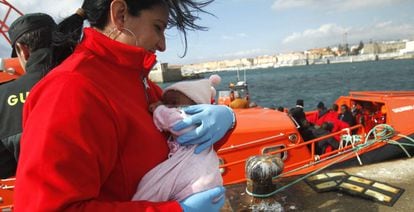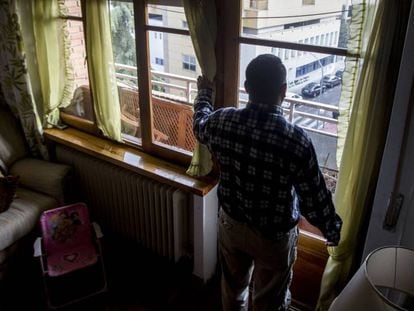Migrant sea arrivals to Iberian Peninsula doubled in 2016
Over 8,000 people reached Spanish coast by boat, not including Ceuta, Melilla and Canary Islands
Death has returned to the Spanish seas. Last week served as a reminder of the cruelty of the migrant crisis after seven people perished in the Mediterranean. Six of the bodies washed up on a beach in Cádiz province, and the seventh was found inside a migrant vessel 35 nautical miles from the Spanish city of Ceuta, located on the northern coast of Africa.

They were undocumented migrants who braved the rough seas, the winter weather and the political efforts to dissuade them from coming to Europe, risking everything in search of a better life.
They were following the same migration route as the 8,162 others who landed on the shores of the Iberian Peninsula last year, according to the International Organization for Migration (IOM). In 2016, the number of migrants who made this dangerous journey doubled compared to 2015, according to the IOM.
Even with the closure of the Balkan and Aegean routes, the flow of Syrians, Afghans and Iraqis has not moved west
“Despite this increase, we are talking about numbers that are absolutely minor compared to other migratory routes, such as the Sicily Canal or the Greece-Turkey border, where hundreds of thousands of people pass,” said Carlos Arce, coordinator of migration for the Andalusia Association for Human Rights (APDHA).
Eight years ago, an agreement of cooperation between Spain and Morocco reduced the migratory pressure around the Strait of Gibraltar. However, the number of migrants in 2016 returned to pre-2009 levels, when the number of people using this route was still recovering from the “cayuco crisis” of 2006 and 2007, so named after the makeshift migrant boats that arrived by the thousands at that time. According to the UN, in 2006 alone approximately 10,000 migrants arrived to Spain by boat.
“Without Moroccan collaboration in monitoring the seas, and without them impeding sub-Saharan Africans from taking to the sea, the arrivals would be much more frequent,” suggests a report by the Spanish think-tank Real Instituto Elcano.

“We saw it in 2014, when nearly 1,200 people reached Tarifa [Cádiz] by boat in just two days, right after the Moroccan king had an incident with Spanish patrol boats,” said Arce, of APDHA. For several days, beach surveillance had been “dysfunctional,” Moroccan authorities confirmed.
Economic Migrants
The migration route that runs through the Strait of Gibraltar was reactivated in 2016, according to IOM’s numbers. Along with Italy, Greece, Cyprus and Bulgaria, Spain is one of the main countries where migrants first land. According to EU law, migrants must seek asylum in the first country of arrival. Yet the majority of migrants to Spain do not meet the EU criteria for refugee status, meaning they are considered economic migrants and the government is allowed to deport them to their countries of origin.
Last year 23.1% of migrants who arrived by sea to peninsular Spain came from the Ivory Coast, 17% came from Algeria and 13% came from Guinea, according to data from the European Union borders agency Frontex. But these figures do not include Ceuta, Melilla or the Canary Islands, where many arrivals take place.
Sources from Frontex, which operates in the westernmost portion of the Mediterranean Sea alongside Spain’s Civil Guard and rescue coordinators, said that even with the closure of the Balkan route and the Aegean Sea Route, the flow of Syrians, Afghans and Iraqis has not moved west. However, they said they have been “monitoring a large group of migrants” on the move in northern Africa.
English version by Alyssa McMurtry.













































